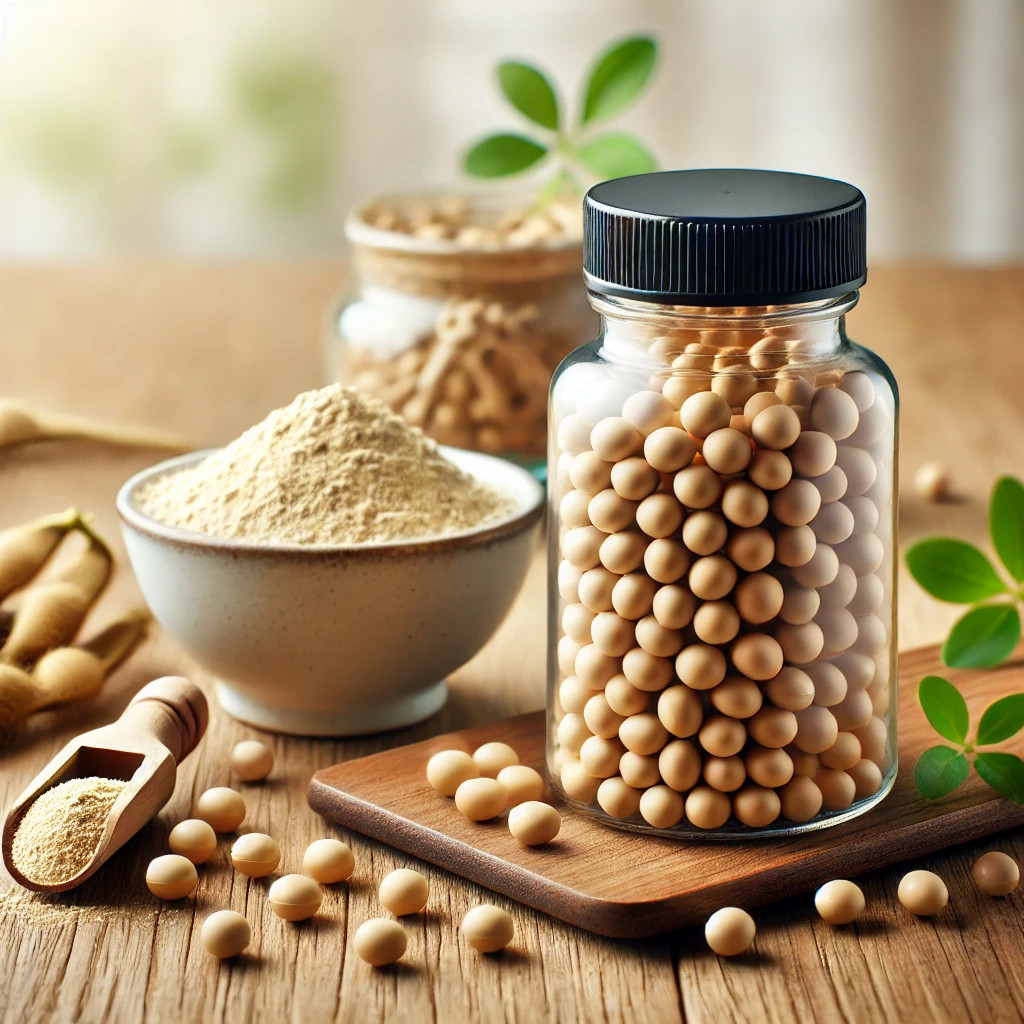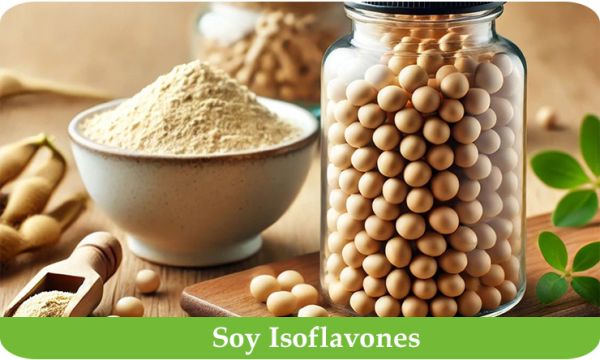The Ultimate Guide to Soy Isoflavones: Benefits, Uses, and How They Support Health
Posted November 12, 2024 by qualityherb
Soy isoflavones are a natural compound found in soybeans and other soy products that have gained recognition for their potential health benefits, particularly for women’s health.
Soy isoflavones are a natural compound found in soybeans and other soy products that have gained recognition for their potential health benefits, particularly for women’s health. These plant-based compounds act as phytoestrogens, mimicking the body’s estrogen in a mild way, and have been studied for their effects on bone health, menopause symptoms, heart health, and more. If you’re curious about what soy isoflavones are and how they may fit into your wellness routine, this guide covers everything you need to know!
What are Soy Isoflavones?
Soy isoflavones are naturally occurring plant compounds (phytoestrogens) in soybeans and soy-based foods, such as tofu, tempeh, and soy milk. They are known as phytoestrogens because they have a chemical structure similar to estrogen, a hormone naturally produced by the body. This structure allows them to bind to estrogen receptors, although their effects are much milder than human estrogen.
There are three primary types of isoflavones in soybeans:
Genistein: The most abundant soy isoflavone, genistein is known for its potential role in promoting bone health, supporting heart health, and easing menopausal symptoms. Daidzein: This isoflavone is also linked to menopause symptom relief and has been researched for its positive effects on cognitive health. Glycitein: Though found in smaller amounts, glycitein contributes to the overall benefits of soy isoflavones and may also play a role in supporting health and wellness.Because they can mimic estrogen, soy isoflavones may help balance hormone levels, making them especially beneficial for women going through menopause, though men can benefit from their antioxidant and anti-inflammatory properties as well.
Health Benefits of Soy Isoflavones
1. Relief from Menopausal Symptoms
One of the most popular uses of soy isoflavones is for the management of menopausal symptoms. Studies suggest that soy isoflavones can help reduce hot flashes, night sweats, and other discomforts associated with menopause. By gently mimicking estrogen, isoflavones may help stabilize fluctuating hormone levels that cause these symptoms, offering a natural alternative to hormone replacement therapy (HRT) for some women.
2. Supports Bone Health
As estrogen levels decline during menopause, women are at a higher risk for bone density loss, which can lead to osteoporosis. Soy isoflavones, particularly genistein, have shown promise in supporting bone health by reducing bone resorption (the breakdown of bone) and promoting bone formation. Regular intake of soy isoflavones has been linked to better bone density, especially in postmenopausal women, making it a valuable addition to a bone health regimen.
3. Promotes Heart Health
Soy isoflavones may help reduce cholesterol levels, support healthy blood vessels, and improve circulation. These compounds have been shown to lower LDL (bad) cholesterol levels without impacting HDL (good) cholesterol. Isoflavones also have mild anti-inflammatory properties, which support heart health by helping reduce blood pressure and prevent damage to blood vessels.
4. Antioxidant Benefits
As potent antioxidants, soy isoflavones help the body fight off free radicals, unstable molecules that can lead to cellular damage and contribute to aging and chronic disease. The antioxidant action of isoflavones is particularly beneficial for skin health, protecting skin cells from oxidative stress and promoting a youthful appearance.
5. May Support Brain Health and Cognition
Emerging research suggests that soy isoflavones may benefit cognitive health and could be linked to a reduced risk of age-related memory decline. While more research is needed, some studies suggest that isoflavones, particularly daidzein, may support cognitive function and reduce the risk of neurodegenerative conditions, especially in postmenopausal women.
How to Use Soy Isoflavones
Soy isoflavones are available in several forms, so it’s easy to incorporate them into your diet:
Food Sources: The best natural sources of soy isoflavones are whole soy foods like tofu, tempeh, soy milk, miso, and edamame. For most people, adding these foods to their diet is an effective and delicious way to gain the benefits of isoflavones. Supplements: Soy isoflavones are also available in supplement form, often as capsules or powders. This can be a convenient option, especially for those who don’t consume soy-based foods regularly or prefer a standardized dose. Look for supplements that list the specific amounts of genistein and daidzein for best results. Topical Creams: Some skincare products contain soy isoflavones as an ingredient due to their antioxidant and anti-aging properties. These creams can be beneficial for improving skin health and elasticity.Choosing a Quality Soy Isoflavone Supplement
To get the best results from soy isoflavone supplements, it’s essential to select a high-quality product. Here’s what to look for:
Standardized Extract: Look for products that specify the amount of genistein and daidzein, as these are the primary active isoflavones in soy. A standardized extract ensures you’re getting consistent and potent doses. Non-GMO and Organic: Choose supplements made from non-GMO and organic soy, as soy is one of the most commonly genetically modified crops. Organic options also reduce the risk of pesticide exposure. Minimal Additives: Check the label for unnecessary fillers, additives, or preservatives. Ideally, the supplement should contain only the active ingredient and minimal other ingredients. Third-Party Testing: Select supplements that undergo third-party testing for quality and purity to ensure you’re getting a safe product.Dosage Recommendations for Soy Isoflavones
There’s no universal dose for soy isoflavones, as needs vary based on factors like age, health goals, and specific health conditions. For general support, studies suggest a daily dose between 40–80 mg of soy isoflavones, though menopausal women may benefit from a dose closer to 80 mg per day. As with any supplement, it’s best to start with a lower dose and consult a healthcare provider if you’re unsure about the appropriate amount for you.
Potential Side Effects and Precautions
Soy isoflavones are generally safe for most people when consumed in moderate amounts. However, there are a few considerations to keep in mind:
Digestive Discomfort: Some individuals may experience mild digestive issues, such as bloating or gas, particularly when first adding soy isoflavones to their diet. Start with small doses and gradually increase to avoid discomfort. Thyroid Function: Soy isoflavones may affect thyroid function, particularly in individuals with an existing thyroid disorder. While moderate amounts are generally safe, those with hypothyroidism should consult a healthcare provider before using soy isoflavones regularly. Hormone-Dependent Conditions: Because soy isoflavones have estrogen-like effects, individuals with hormone-sensitive conditions, such as certain types of breast cancer, should speak to a healthcare provider before use. Drug Interactions: Isoflavones may interact with certain medications, particularly hormone replacement therapy or thyroid medications. Always consult with a healthcare provider if you are on prescription medications before adding soy isoflavones to your routine.Is Soy Isoflavone Right for You?
If you’re looking for a natural way to support heart health, bone density, skin health, and hormone balance, soy isoflavones may be a great addition to your wellness routine. They’re particularly beneficial for women approaching menopause or experiencing hormonal fluctuations, but men can also benefit from their antioxidant properties. If you’re hesitant about consuming soy foods, supplements provide a convenient alternative that allows you to control your intake.
Practical Tips for Adding Soy Isoflavones to Your Routine
Combine with a Healthy Diet: Soy isoflavones are most effective when part of a balanced diet that includes plenty of fruits, vegetables, whole grains, and healthy fats. This combination will support your overall health and help maximize the benefits of isoflavones. Use in Cooking: Try adding tofu, tempeh, or edamame to your meals as a plant-based protein source. Tofu is especially versatile and can be used in stir-fries, smoothies, salads, and more. Experiment with Different Forms: If you don’t enjoy soy-based foods, experiment with soy isoflavone supplements or even topical products to see what works best for you. Be Consistent: Like many natural supplements, soy isoflavones work best when taken consistently. Make them a regular part of your routine to see sustained benefits.Conclusion
Soy isoflavones offer a wide range of health benefits, from supporting heart and bone health to reducing menopause symptoms and acting as antioxidants. Whether you’re experiencing menopause symptoms or simply looking for an all-natural supplement to support wellness, soy isoflavones can be a valuable addition to a balanced diet and healthy lifestyle.
Remember, the key to getting the most out of soy isoflavones is to choose high-quality products, start with moderate doses, and monitor how your body responds. Embrace the power of these natural phytoestrogens and see how they can enhance your journey to better health!


| Contact Email | [email protected] |
| Issued By | Xuancheng Quality Herb Co.ltd. |
| Website | Soy isoflavones |
| Phone | +865633031563 |
| Business Address | 8-402,FEICUICHENG, |
| Country | China |
| Categories | Agriculture , Biotech , Blogging |
| Tags | soy isoflavones , soybean extract , genistein , daidzein , glycitein |
| Last Updated | November 12, 2024 |


